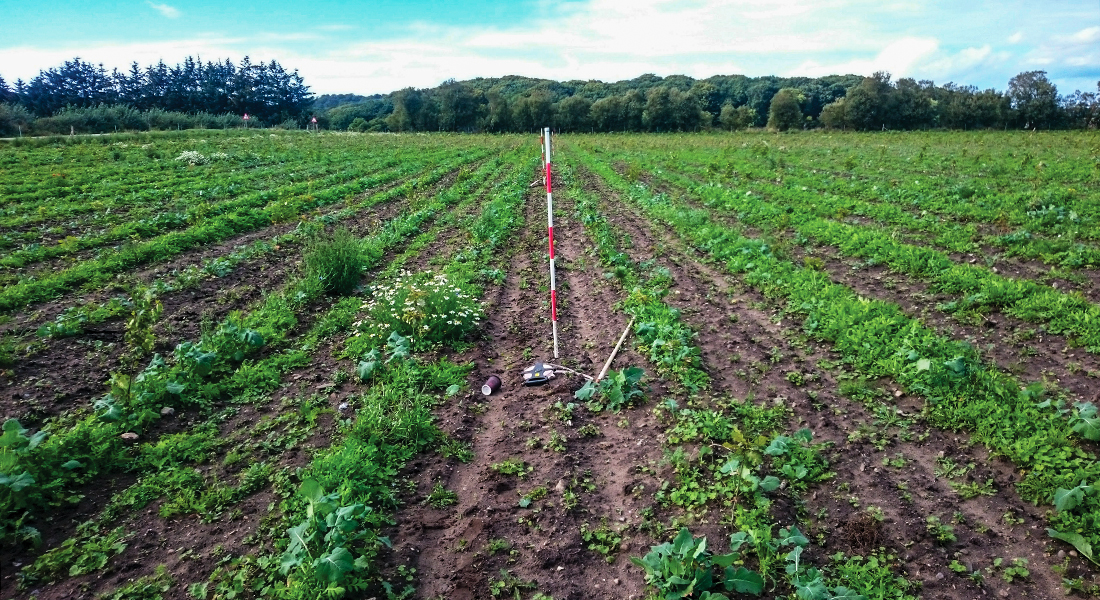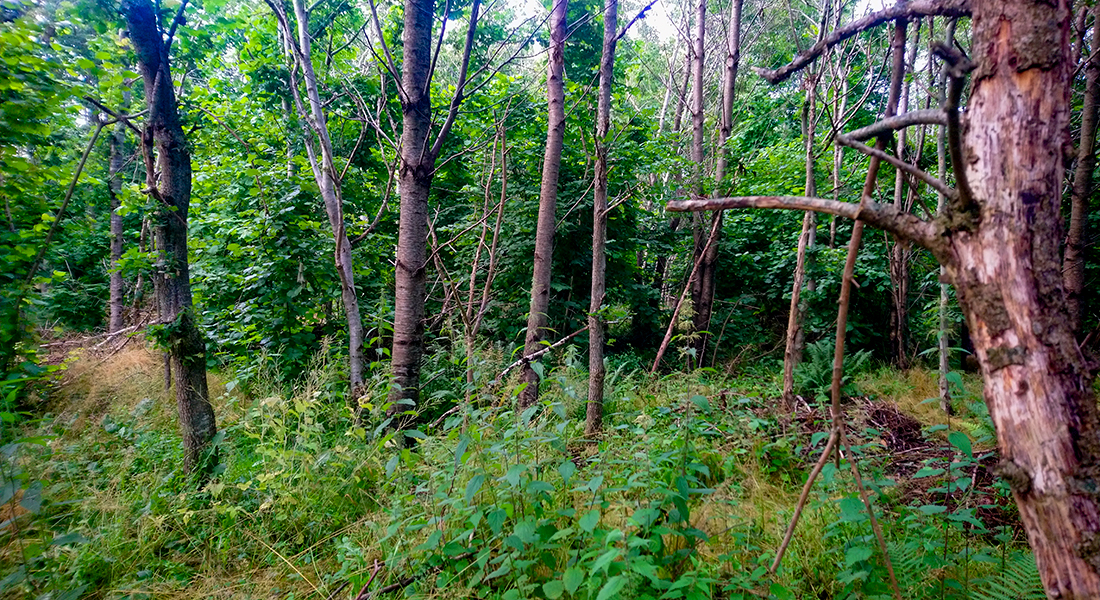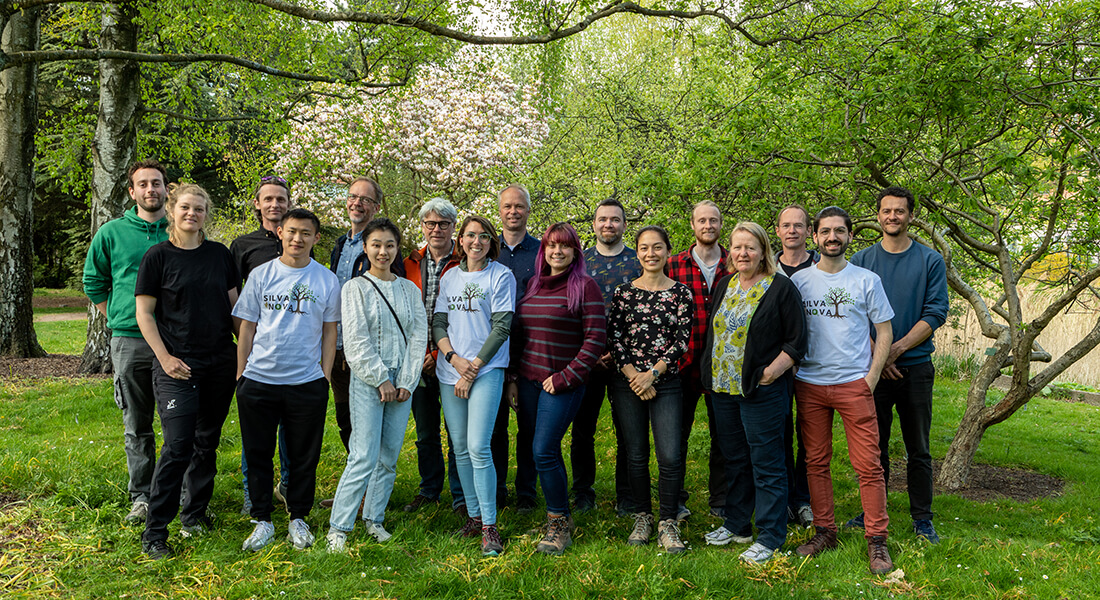Silva Nova
Restoring soil biology and soil functions to gain multiple benefits in new forests.
The research focus on how to use afforestation as an instrument in combatting climate change by sequestering carbon in trees but also how to use the resulting forests as habitats for species that can help to strengthen biodiversity.
The project will investigate whether inoculating former arable land with soil from old forests will make establishing new forests on agricultural land faster and more efficient. The hypothesis is that microorganisms that benefit tree growth are not present in agricultural land and that transplantation can establish the right microbiome to support and accelerate forest restoration.
When we plant trees in a field, a forest eventually grows. However, soil processes, the microbiome and plant communities continue to resemble fallow land. Regenerating the soil to support forests may thus take centuries. Our project will explore the transition from field to forest and find methods to turbocharge this development to benefit biodiversity and the environment. In Denmark, we have a plan to double the forest area.
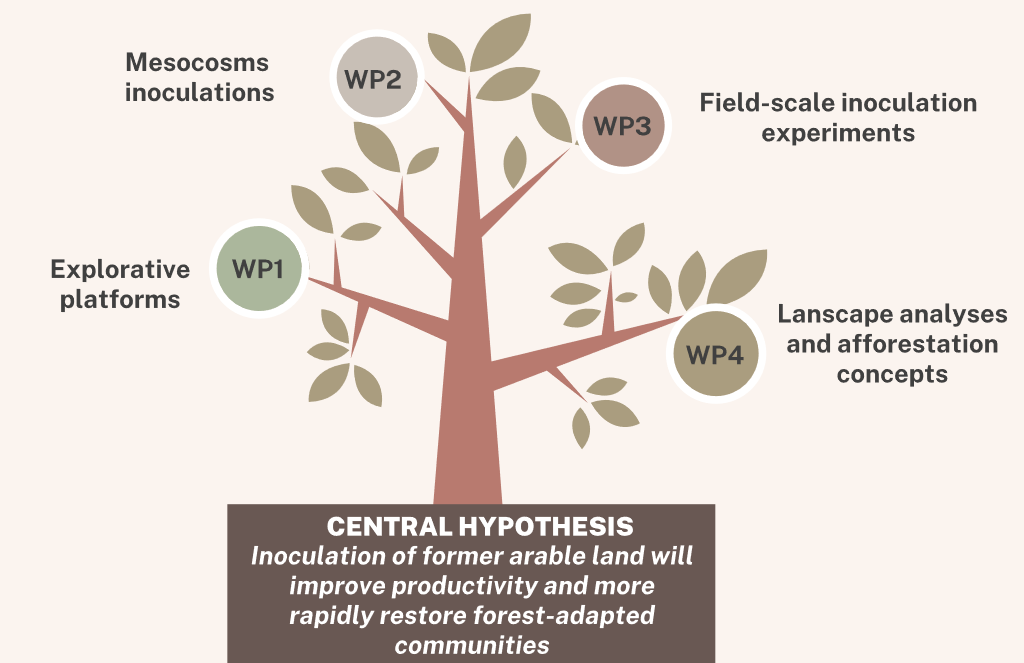
The project has three experimental work packages (WP1-3) that feed into a landscape oriented analysis and synthesis work package (WP4). Our goals in each work package are to:
- evaluate temporal and spatial responses in biomass production, flora and fauna, soil microbiota and soil functions to afforestation of former cropland in the baseline situation without assisted dispersal (WP1);
- quantify effects of inoculation methods regarding donor, amount and application mode of inoculum to different soil types and tree species using mesocosm approaches (WP2);
- expand knowledge of inoculation methods from mesocosm to field-scale implementation and documentation (WP3);
- synthesize previous WPs to develop concepts for assessment and planning of afforestation at the landscape scale and provide a decision tool for afforestation strategies including use of assisted dispersal (WP4).
Silva Nova is a cross-disciplinary project that aims to resolve barriers for successful restoration and develop landscape-scale afforestation strategies that optimize ecosystem functioning and biodiversity.
Our team encompasses a broad range of research areas and expertise such as:
Biogeochemistry
Soil functions, C sequestration, N retention, greenhouse gasses, soil and plant’s chemical properties.
Contact: Per Gundersen and Lars Vesterdal
Biodiversity
Relationships and feedbacks between organisms, plant diversity, entomology.
Contact: Inger Kappel Schmidt, Sebastian Kepfer Rojas and David B. Byriel
Ecology plat-soil interactions
Inoculation techniques, mesocosm experiments, soil transplantations, microbiome.
Contact: Martijn T. Bezemer and Sofia Fernandes Gomes
Molecular techniques and development
High-throughput eDNA sequencing, microbiome, bioinformatics, fungal diversity.
Contact: Leho Tedersoo and Sten Anslan
Landscape and ecosystem functioning
Remote sensing, forest structure (LiDAR), landscape analyses.
Contact: Sebastian Kepfer-Rojas
Peer-reviewed articles
Lu, Y., Eisenhauer, N., Patoine, G. et al. (2026)
Landscape effects on global soil pathogenic fungal diversity across spatial scales
Balducci, L., Haeler, E., Paillet, Y. et al. (2026)
European forest carbon and biodiversity policies have a limited win-win potential
Davide Barsotti, Sebastian Kepfer-Rojas, Yamina Micaela Rosas, Torben Riis-Nielsen, Lars Vesterdal, Per Gundersen, Inger Kappel Schmidt (2025).
Understory vegetation development along 60-year chronosequences of oak, beech, and Norway spruce
Marco Basile, Thibault Lachat, Lorenzo Balducci, Francesco Chianucci, Lucas Chojnacki, Frédéric Archaux, Dimitrios Avtzis, Christophe Bouget, Pallieter De Smedt, Inken Doerfler, Yann Dumas, Zoltán Elek, Marion Gosselin, Martin Gossner, Jacob Heilmann-Clausen, Jeňýk Hofmeister, Jan Hošek, Philippe Janssen, Mathias Just Justesen, Aslak Kappel Hansen, Inger Kappel Schmidt, Sebastian Kepfer-Rojas, Anders Mårell, Radim Matula, Jörg Müller, Björn Nordén, Péter Ódor, Yoan Paillet, Sonia Ravera, Tommaso Sitzia, Flóra Tinya, Sabina Burrascano, Eckehard G. Brockerhoff (2025)
Managed forests are a stronghold of non-native beetles in Europe
Georgopoulos K., Bezemer TM., Vesterdal L., Li K., Nobel L., Kasal N., Gomes SIF. (2025)
Soil microbes and nutrient inputs influence root nodulation and tree performance in Alnus glutinosa
Rosas Yamina M, Kappel Schmidt I, Riis-Nielsen T…et al (2025)
Structural diversity, tree species richness and biomass production in new forests on agricultural land – Remote Sensing of Environment
Augusto L, Borelle R, Boča A, … Vesterdal L, … et al. (2025)
Widespread slow growth of acquisitive tree species - Nature
Basile M, Lachat T, Balducci L… et al. (2025)
Managed forests are a stronghold of non‐native beetles in Europe - Basile - Journal of Applied Ecology - Wiley Online Library
Burrascano S, Chojnacki L, Balducci L… et al. (2025)
Towards an effective in-situ biodiversity assessment in European forests - ScienceDirect
Pedersen NK, Kepfer-Rojas S, Riis-Nielsen T, Johannsen V K, Schmidt IK. (2025)
Natural colonization in abandoned agricultural fields benefits native, insect-pollinated and bird-dispersed woody species - ScienceDirect
Gomes SIF, Gundersen P, Bezemer TM, …et al. (2025)
Soil Microbiome Inoculation for Resilient and Multifunctional New Forests in Post-Agricultural Landscapes
https://doi.org/10.1111/gcb.70031
Georgopoulos K, Bezemer TM, Christiansen JR, Larsen KS, Moerman G, Vermeulen R, Anslan S, Tedersoo L, Gomes SIF (2024)
Reduction of forest soil biota impacts tree performance but not greenhouse gas fluxes
https://doi.org/10.1016/j.soilbio.2024.109643
Rheault K, Christiansen JR, Larsen KS (2024)
goFlux: A user-friendly way to calculate GHG fluxes yourself, regardless of user experience. DOI: 10.21105/joss.06393
Tedersoo L, Drenkhan R, Abarenkov K, Anslan S, et al. (2024)
The influence of tree genus, phylogeny, and richness on the specificity, rarity, and diversity of ectomycorrhizal fungi
https://doi.org/10.1111/1758-2229.13253
Georgopoulos K, Bezemer MT, Neeft L, Camargo AM, Anslan S, Tedersoo L, Gomes SIF (2024)
Effects of soil biotic and abiotic characteristics on tree growth and aboveground herbivory during early afforestation
https://doi.org/10.1016/j.apsoil.2024.105579
Gundersen P, Bezemer ТM, Rojas SK, Tedersoo L, Vesterdal L, Schmidt IK (2023)
Silva Nova – Restoring soil biology and soil functions to gain multiple benefits in new forests.
Research Ideas and Outcomes 9: e101455.
Tedersoo, L. et al. (2022)
Towards understanding diversity, endemicity and global change vulnerability of soil fungi. bioRxiv
Klavina, D., Tedersoo, L., Agan, A. et al. (2022)
Soil fungal communities in young Norway spruce-dominant stands: footprints of former land use and selective thinning.
Eur J Forest Res 141, 503–516
Tedersoo, L., Bahram, M., Zinger, L., Nilsson, R. H., Kennedy, P. G., Yang, T., Anslan, S., & Mikryukov, V. (2022)
Best practices in metabarcoding of fungi: From experimental design to results. Molecular Ecology, 31, 2769– 2795.
Bahram, M., Espenberg, M., Pärn, J. et al. (2022)
Structure and function of the soil microbiome underlying N2O emissions from global wetlands. Nat Commun 13, 1430
Tedersoo L, Albertsen M, Anslan S, Callahan B. (2021)
Perspectives and Benefits of High-Throughput Long-Read Sequencing in Microbial Ecology. Appl Environ Microbiol. 87(17):e0062621.
Tedersoo, L., Mikryukov, V., Anslan, S. et al. (2021)
The Global Soil Mycobiome consortium dataset for boosting fungal diversity research. Fungal Diversity 111, 573–588.
Anslan S, Mikryukov V, Armolaitis K, Ankuda J, Lazdina D, Makovskis K, Vesterdal L, Schmidt IK, Tedersoo L. (2021)
Highly comparable metabarcoding results from MGI-Tech and Illumina sequencing platforms. PeerJ 9:e12254
Available student projects
Silva Nova offers several opportunities to do exciting MSc. and BSc. projects as well as internships. Have a look at our “Research areas and expertise” and get in touch with the leading researchers to hear about available projects.
Ongoing MSc projects
Completed MSc projects
2025
Sachin Timilsina
Thesis title: "Tree Biomass, Carbon Stocks, and Flying Insect Biomass Across Different Habitat Typen in Danish Landscapes"
Supervisor: Dr Raphaël Manlay
Host Supervisor: Sebastian Kepfer Rojas
2024
Lasse Egebjerg Ravn
Thesis title: ”Soil profile development with time after afforestation of arable land investigated by natural stabile isotope analysis”
Supervisors: Per Gundersen, Per Ambus
Vivien Kovacs
Thesis title: “Exploring the Influence of Former Land Use on Soil Characteristics and Biodiversity Indicators across Denmark”
Supervisors: Per Gundersen, David Bille Byriel
2023
Heyu Chen
Thesis title: “Effects of litter removal, tree species and stand age on GHG fluxes at Vestskoven”
Supervisors: Klaus S. Larsen, Karelle Rheault
Anna Karina Zimmermann
Thesis title: “Diversity of surface-active arthropods in young forests in Denmark, Comparing the effects of afforestation by planting of trees and natural colonization of former agricultural land”
Supervisors: David B. Byriel, Inger Kappel Schmidt, Chatchai Kosawang
Thea Jedig Steenberg
Thesis title: “Colonization of ground beetles (Coleoptera: Carabidae) in naturally colonized vs. planted forest on former agricultural land”
Supervisors: Inger Kappel Schmidt, David B. Byriel
Benedicte Lütken
Thesis title: “Development of carbon and nitrogen stocks in forest floors under oak and Norway spruce following afforestation - third resampling of chronosequences in Vestskoven”
Supervisor: Lars Vesterdal
Théo Bauza
Thesis title: “Establishing afforestation methods to promote biodiversity: Study of the effects of afforestation practices on spiders (Araneae) and harvestmen (Opiliones) diversity in Denmark’s young forests”
Supervisor: David B. Byriel
2022
Marie L.D. d l C. Bergmann
Thesis title: “Carbon sequestration in natural forest regeneration versus direct planted forests”
Supervisor: Prof. Per Gundersen (KU)
Sascha H. Hansen and Birgitte R. Diget
Thesis title: “The effect of afforestation on former agricultural land - nitrate levels under oak and beech stands”
Supervisor: Prof. Per Gundersen (KU).
Sabrina Kogler
Thesis title: “Effects of tree species and stand age on GHG fluxes at Vestskoven”
Supervisors (KU): Klaus S. Larsen and Jesper R. Christiansen
Co-supervisors: Sophie Zechmeister-Boltenstern (BOKU); Karelle Rheault (KU).
2021
Bülow-Hansen J.L.
Thesis title: ”Using field and LIDAR data to investigate the structural development in Vestskoven”
Supervisor: Sebastian Kepfer Rojas, associate professor (KU).
Ledin D.K.
Thesis title: “Structural analysis of biodiversity potential of young afforestation on fertile, post-agricultural soil”
Supervisor: Prof. Inger Kappel Schmidt (KU).
Funded by

Silva Nova has received six year funding from Novo Nordisk Foundation
Project: Silva Nova
Period: March 2021- December 2027
Contact
Per Gundersen
Principal Investigator
pgu@ign.ku.dk
Inger Kappel Schmidt
Co-Principal Investigator
iks@ign.ku.dk
Anna Karina Zimmermann
Research Coordinator
akzi@science.ku.dk
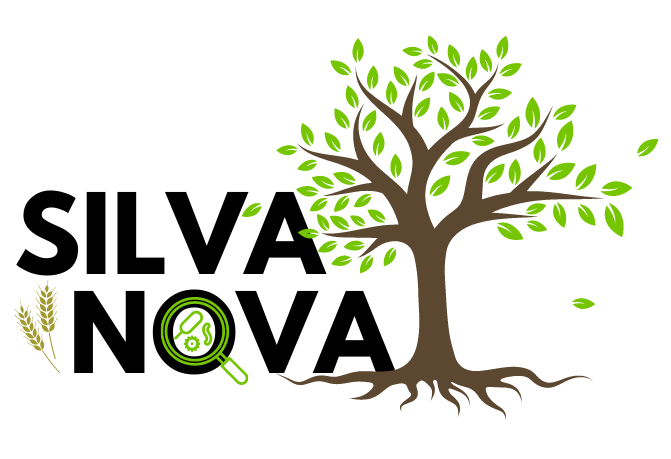
Collaborators
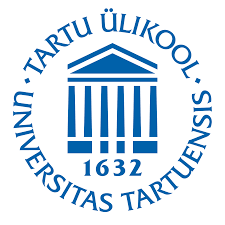 |

